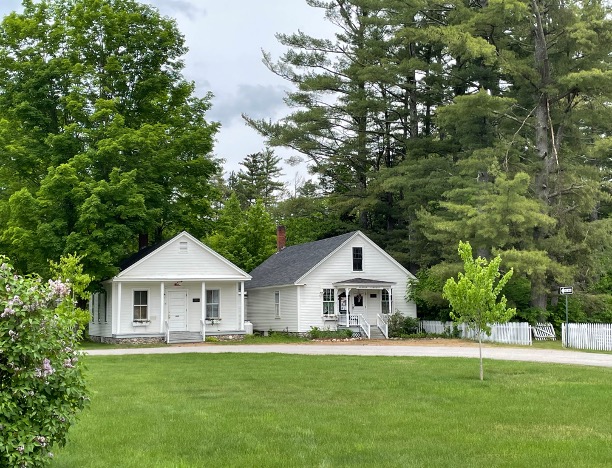By PAULA TRACY, InDepthNH.org
CONCORD – An old growth maple forest in Stewartstown, Hebron’s Town Library and the Center School in Atkinson are among more than two dozen treasured community assets that will be preserved by a grant match from the state’s Land and Community Heritage Investment Program in 2025.
While fewer dollars were available, on average, this year compared to other years because of the quiet real estate market, the program was able to help a number of incredibly valuable projects, said Paula Bellemore, LCHIP’s executive director in an interview Monday.
The one-to-one matching grant program has been a monumental success, noted Gov. Chris Sununu who with LCHIP Board Chair Richard Lewis announced 26 grants totaling $3.3 million awarded to municipalities and nonprofit organizations to support land conservation and historic preservation initiatives across the state Monday morning.
Kate Rochford, president of Atkinson Historical Society, said a $54,725 grant for the restoration of the Center School Project “will help us realize our goal” of restoring the building to allow visitors to experience an 1800s one-room schoolhouse.
Built in 1879, the building later was used by the town for a police department and selectmen’s office, Rochford said.
The Center School is located at 16 Academy Ave., Atkinson and is on the NH State Register of Historic Places.
Another big project for a small town is the Hebron Town Library which received a $100,000 grant to support the expansion of the library and the rehabilitation of the historic Granite Hall and Memorial Chapel.
George Bolin, chair of the board of the Hebron Library Trustees, said the grant will “enable the Town of Hebron to protect and preserve this historic resource while also expanding our library function into the adjacent and vacant Memorial Chapel to better serve our citizens.”
An interesting land grant, Bellemore said, will go to preserve 100 acres in Portsmouth near the urban forestry center and just off busy Lafayette Road.
“Who would have thought there were still 100 acres left in Portsmouth?” she said.
An interesting land project she pointed to is in the state’s North Country in Stewartstown where 248 acres of the Amey property, including an old growth maple forest will be conserved with an easement held by the Ammonoosuc Conservation Trust.
LCHIP, she said, has had trouble finding organizations willing to hold easements in the north country but ACT is willing to hold the easement in this case. The Amey project will get a $150,000 grant which at least ensures its conservation.
Established by the state legislature in 2000, LCHIP’s matching grants are invested in community-based public-private partnerships seeking to voluntarily conserve and preserve the state’s natural, cultural, and historic heritage.
Now completing its 23nd grant round, LCHIP’s rigorous grant application and vetting process is one of the most highly competitive in the state, with only 58 percent of applicants receiving funding in 2024.
Initially, the legislature gave the program grants from the general fund which went up and down in amounts.
Since 2009 the source of funding has been a $25 fee assessed at the registry deeds for any deed transfer, mortgage, mortgage discharge or subdivision plan.
Bellemore noted that for the first four years it generated on average $4 million a year. Now, she said the average is $4.4 million with only a 10 percent increase despite a huge jump in the value of the property.
“Our funding is tied to the pace of the market, not the value of the market,” she said.
In the years when people were refinancing mortgages and even during COVID-19 when many were purchasing homes here to get out of cities, the revenues for LCHIP were strong but she said now the market is stalled with fewer people buying and selling or refinancing.
This past year, the fund collected closer to $3 million, and it started with 69 project requests.
“We were only able to fund 26 and the grants don’t go as far as they used to,” she said noting a volunteer group could come up with costs for a new roof, for example, and by the time they get the grant, the price has gone up and they have to go find additional funding sources.
Back in 2000, it was envisioned the program would need $12 million annually to address the backlog of deferred maintenance and land and that it would eventually level off once all the projects were completed, but Bellemore said that has not happened.
“Sometimes, it takes years for towns to find the right volunteers” to work on getting projects to the point of applying for the grants.
She said a dedicated funding source which is not as subject to the whims of the market might be more sustainable and she said she believes there are bills being worked on in the legislature for this coming session to address the problem, including a possible historic rehabilitation tax credit program.
To increase the fee at the registry would be problematic in that it would be an additional cost for people who are already facing huge costs associated with real estate.
The grants from this round will support efforts to rehabilitate 14 historic buildings and permanently conserve more than 3,314 acres of farm, timber, and ecologically significant land in 24 communities around the state.
LCHIP grant recipients must match each dollar contributed by LCHIP with at least one added dollar and complete the funded projects according to the program’s rigorous standards.
This year’s $3.3 million in grant awards will be matched by more than $9 million contributed by other public and private sources, infusing $12.3 million into the state’s economy through direct project activity.
Since 2001, LCHIP has awarded 615 grants, totaling over $65 million.
As of July 2024, the program’s investment has helped to conserve 246,000 acres of land and rehabilitate 184 historic structures across 204 New Hampshire communities.
A link to all the projects awarded is here: https://indepthnh.org/wp-content/uploads/2024/12/LCHIP-2024-Award-Summaries-2.pdf





